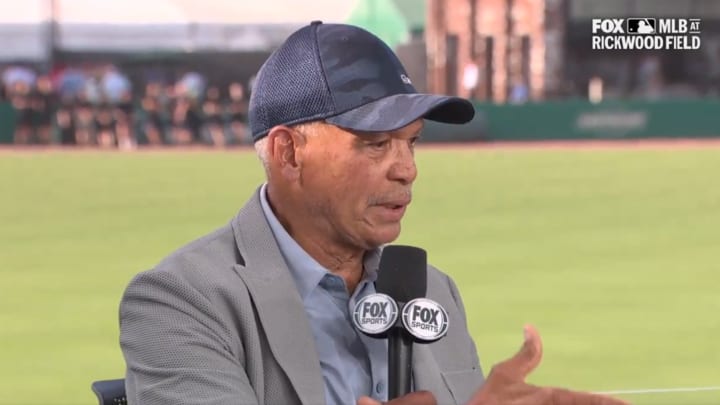Reggie Jackson Reflected on Rickwood Field History With Stunning Emotional Storytelling

Major League Baseball put on a night to honor one of baseball's most complicated eras on Thursday Night, playing a game between the San Francisco Giants and St. Louis Cardinals at Rickwood Field, where the Black Barons of the Negro Leagues once played. St. Louis won, 6-5.
Earlier this year, MLB honored the history and validity of the Negro Leagues by officially combining restored statistics from the Negro Leagues with the MLB's statistical database.
Before the game, Reggie Jackson, who played at Rickwood Field as a minor league player, spoke on what the field meant to him.
The clip and quotes below feature themes of racism and discrimination.
Reggie Jackson played in Birmingham when he was in the minor leagues back in 1967.
— The Athletic (@TheAthletic) June 20, 2024
In his return to Rickwood Field, he shared his experience with racism and discrimination.
"Coming back here is not easy."
🎥 @MLBONFOX pic.twitter.com/RONxQXju5f
Asked by Alex Rodriguez what the emotions are like to come back to Rickwood Field. Jackson played for the Birmingham A's in the 1967 season, the AA affiliate of the Kansas City Athletics.
Here's what Jackson had to say as he reflected on the toughness of returning to Birmingham and Rickwood:
"Coming back here is not easy. The racism when I played here, the difficulty of going through different places where we traveled. Fortunately I had a manager and I had players on the team that helped me get through it. But I wouldn't wish it on anybody. People said to me, today I spoke and said, 'Do you think you're a better person, do you think you won when you played here and conquered?' I said, you know, I would never want to do it again. I walked into restaurants and they would point at me and say, 'the n----- can't eat here.' I would go to a hotel and they say the n----- can't stay here. We went to Charlie Finley's country club for a welcome home dinner and they pointed me out with the N word... Finley marched the whole team out, finally they let me in there. He said, 'we're going to go to the diner and eat hamburgers, we'll go where we're wanted.'"
Jackson spoke about his AA manager, Johnny McNamara, who managed him in Birmingham and also came up to manage the major league A's in 1969, reuniting with Jackson for the end of 1969 and the 1970 season:
"Fortunately I had a manager in Johnny McNamara that if I couldn't eat in the place nobody could eat, we'd get food to travel. If I couldn't stay in the hotel they'd drive to the next hotel and find a place where I could stay."
In addition to McNamara, Jackson named others like Rollie Fingers, Dave Duncan, and Joe and Sharon Rudi. Jackson spoke about how he once stayed on the Rudis' couch for several nights a week for several weeks. He only left once there were threats made of burning the Ruidis apartment complex down because of Jackson staying there.
"I wouldn't wish it on anyone. At the same time, had it not been for my white friends, had it not been for a white manager... I would have never made it. I was too physically violent, I was ready to physically fight someone. I'd have got killed here because I'd have beat someone's a--, and you'd have saw me in an oak tree somewhere."
